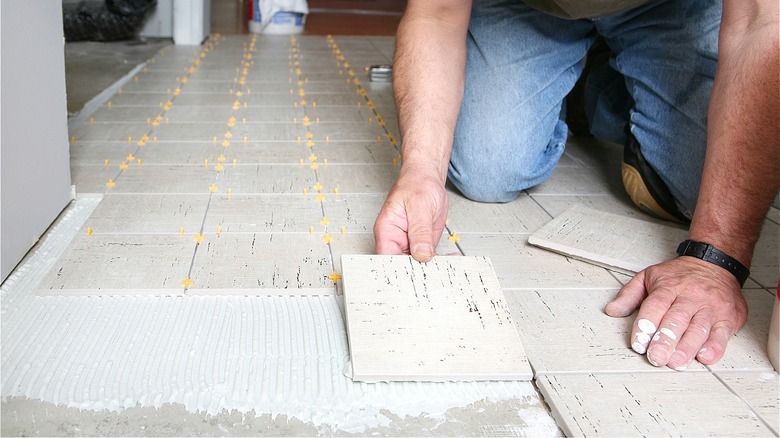If one is to consider the aspects of a corporate environment, then all of them play a role in influencing the experience of employees, customers, and organizational outcomes. However, one element that is often taken for granted when it comes to interior design is flooring. Tiles in a business space provide numerous benefits that can transform the business by enhancing its image and environment and making the management of the business premises easier. Starting with appearance and moving toward usability. This article will discuss some advantages that make tiles a valuable asset for your company.
Durability and Longevity
Ceramic tiles are long-lasting and wear-resistant; therefore, they are ideal for installation in commercial buildings. Unlike most other flooring types, which may get damaged or destroyed within a short time, such as carpet or timber, tiles have a lifespan of several decades with very little wear and tear. Such long-term durability results in cost savings since the business will not have to change the flooring as often or use the money to refinish it.
Floor tiles made from porcelain or ceramic are especially useful in hallways, shops, hotels, and offices with heavy traffic. These materials are resistant to impacts, abrasions, and other factors characteristic of busy areas to maintain the integrity of the flooring and its aesthetic value. However, the durability of tiles is only assured, provided they are sourced from good manufacturers and suppliers, such as tiles Melbourne. One potential mistake that should be avoided is selecting substandard or fake tiles that may scratch, chip, or fade easily compared to standard ones. These include substandard products that can even reduce the initial investment due to early wear and tear requiring repairs or replacement, consequently incurring high costs.
Visual appeal and functionality
There are so many tile styles, colors, and textures that everyone can find something they have been dreaming of for their business space. Regarding tiles, there is flexibility in fitting the business needs, either for the modern and simple appearance or even the luxurious, classy appearance.
High-quality tiles provide a richer first impression in sectors where aesthetics matter most, like showrooms, luxury retail shops, and commercial offices. White marble has a rich, luxurious look and handles grime effortlessly, while large-format porcelain tiles appear chic and modern. These characteristics allow the tiles to integrate easily into numerous commercial design strategies and improve the customer experience.
Easy Maintenance and Hygiene
Any organization must keep its surroundings clean, particularly for organizations that come into contact with the public, such as hotels, hospitals, or restaurants. Tiles are extremely nonporous, and it is very difficult for things like stains, spills, or dirt to seep into the surface of the tiles, or for that matter, to stick to them, and they can easily be washed with a mop or a wipe. This is a great advantage over other types of flooring that can let in moisture or hold dirt, leading to a more demanding process when cleaning and thus overly expensive.
Moreover, dust and other particles, such as pet dander, do not accumulate on the tiles and help enhance indoor air quality. This aspect is most beneficial when a clean environment is necessary, like doctors’ offices or childcare centers.
Enhanced Safety Features
Ceramic tiles can not only be an element of elegance but also an element of choice if safety is an issue. Some commercial tiles have anti-slip coefficients on their surface to minimize chances of slipping, especially where water is frequently used, such as in restaurants, gym centers, and restroom areas. This saves costs and time for handling accidents or compensation cases since a non-slip tile minimizes the chances of such occurrences, creating a safe environment for businesses and customers.
Cost Effective and Easy To Maintain
Although it involves some costs and efforts, cost-sharing arrangements are economical in the long run. Thus, while tiles may be more expensive to purchase and install than other types of flooring, their long-term benefits of wear and tear and ease of upkeep outweigh the initial investment. Businesses benefit by avoiding recurrent replacements and costly deep-cleaning treatments that may be required with other surfaces.
Moreover, tile floors are easy to maintain and can help reduce energy bills. White and other bright colors help to maximize the use of natural light in a specific area and may minimize the use of artificial lighting during the day. Doing so not only assists in crafting a more well-lit and cheerful environment and contributes to energy conservation.
Eco-Friendly Options
The concept of sustainability is slowly gaining its rightful place in the business environment. Reusable tiles can be regarded as environmentally friendly, and their use can indicate the company’s concern for the environment. Some tile makers create emissions-friendly products from eco-friendly components or renewable elements such as recycled glass.
Versatility to Different Business Requirements
Tiles also enjoy a leeward flexibility that makes them functional for various business establishments, which is suitable for almost any establishment. For instance, the appearance of tiles is likely to offer significant value to retail stores since they give a store a clean and welcoming appearance. Selecting the right type of tiles to fit the specific need makes the customer shop more appealing and makes it comfortable for them to spend more time shopping. This work is done in the reception and other offices to ensure the environment is neat and professional. Their longevity makes them suitable for weathering the service of foot traffic, office chairs, and equipment with ease. Their cleanability means the flooring does not show dirt and stains easily, making the space tidy.
Tiles are an excellent choice for restaurants and cafes because they are beautiful and functional. These areas are characterized by high foot traffic and sometimes accidents that result in spills and stains; such an environment demands a flooring type that can easily be cleaned and preferably washed without harming the surface. Tiles are ideal for this role because they provide the floor with non-absorbent surfaces that are hard for stains to stick to and are easy to clean.
There are several functions of healthcare facilities like clinics and hospitals where proper sanitation and hygiene are crucial, and the floors should also be HIPAA compliant. Nonporous tiles are resistant to bacterial growth and can be thoroughly cleaned and disinfected; this makes them ideal for use in hospitals and other facilities where hygiene is paramount. The versatility of tiles in all these business settings provides insight into why tiles are functional and a strategic decision tool to ensure that a specific space fulfills both utility and decorative aspects.
Boosting Property Value
High-quality, professionally placed tiles can also help improve the value of a commercial property. Hence, consumers or clients interested in purchasing or renting a space would be drawn to a floor that is durable, easy to maintain, and has a nice appearance. This can be very important, especially when leasing or marketing the property.
To Sum It Up!
Introducing tiles in your business environment is not all about the appearance; it is about effectiveness, protection, and value for your money. Regardless of whether your business is based in a store, a food service establishment, or an office, there are unique advantages that tiles can offer that may not be found with other types of flooring. When opting for tiles, you increase the overall attractiveness of your business, functionality, and possibly the value of your property while acting as a responsible member of the environment.

